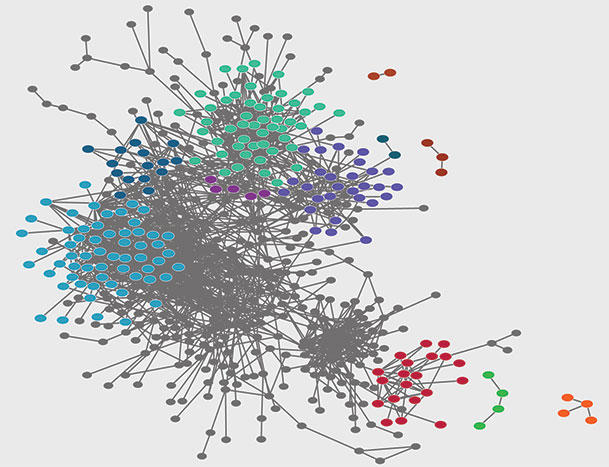The Cancer Genome Atlas (TCGA) catalyzed considerable growth and advancement in the computational biology field by supporting the development of high-throughput genomic characterization technologies, generating a massive quantity of data, and fielding teams of researchers to analyze the data. Below is a collection of some of the tools developed by TCGA network researchers and collaborators that were used to analyze TCGA data.
The Cancer Imaging Archive (TCIA)
A service providing access to radiological imaging data sets in DICOM format from TCGA cases. TCIA supports imaging phenotype-genotype research, in addition to other imaging data sets for cancer imaging analysis. (National Cancer Institute)
The Cancer Proteome Atlas Portal (TCPA)
An integrative data portal for accessing, visualizing, and analyzing proteomic data. (MD Anderson Cancer Center)
cBioPortal for Cancer Genomics
Provides visualization, analysis, and download of large-scale cancer genomics data sets. (Memorial Sloan-Kettering Cancer Center)
Copy Number Portal
A portal for exploring copy number alterations of TCGA data, including results of GISTIC analyses for identifying genes targeted by somatic copy number alterations that drive cancer growth. (Broad Institute)
DeMixT
A software package thatdeconvolutes transcriptome data from a mixture of two (tumor, stroma) or three components (tumor, stroma, immune). It provides both the mixture proportions and individual sample-specific and gene-specific expression levels for each component. (MD Anderson Cancer Center)
FASMIC
An integrative, analytic web platform for annotating the functional impacts of somatic mutations in human cancer. (MD Anderson Cancer Center)
Firehose
A suite of tools and pipelines developed for processing and analyzing various types of large-scale genomic and proteomic data. (Broad Institute)
Firebrowse
A tool to explore and visualize cancer data generated by Broad GDAC Firehose. Provides graphical tools like viewGene to explore expression levels and iCoMutto explore a comprehensive mutation analysis of each TCGA disease and an API for programmers. (Broad Institute)
FunSeq2
A tool to prioritize and annotate somatic variants, particularly non-coding variants, from cancer whole genome sequencing. Uses a pre-built data context generated from multiple genomic and cancer resources that is regularly updated. (Weill Cornell Medicine)
Integrative Genomics Viewer (IGV)
A high-performance visualization tool for interactive exploration of large, integrated data sets. (Broad Institute)
MBatch
A web-based tool for identifying and quantifying batch effects present in processed TCGA data, utilizing hierarchical clustering and enhanced PCA plots. (MD Anderson Cancer Center)
Mutation calling using a Markov Substitution model for Evolution (MuSE)
A mutation caller that models the evolution of the reference allele to the allelic composition of the tumor and normal tissue at each genomic locus and accounts for tumor heterogeneity through a sample-specific error model. (MD Anderson Cancer Center and Baylor College of Medicine)
Regulome Explorer
Web-based interactive tools for visualizing and exploring associations between clinical and molecular TCGA data. (Center for Systems Analysis of the Cancer Regulome)
SurvNet
A web-based tool for identifying network-based biomarkers that correlate with patient survival data. (MD Anderson Cancer Center)
TANRIC
An integrative web server for analyzing lncRNAs in cancer. (MD Anderson Cancer Center)
TumorMap
An interactive portal for visualizing high-dimensional omics data in a 2-dimensional projection rendered with the Google Maps API. A toolbox of statistical tests allows researchers to find associations between sample groupings and clinical, phenotypic, and molecular event annotations. (UC Santa Cruz)
Xena
Xena is a suite of web-based tools to visualize, integrate, and analyze cancer genomics and its associated clinical data. (UC Santa Cruz)
